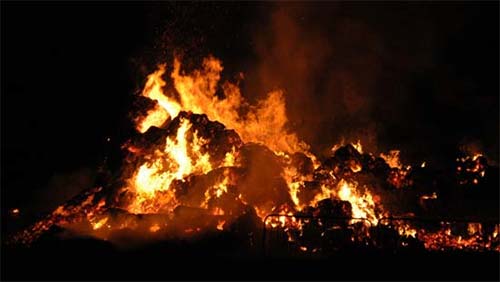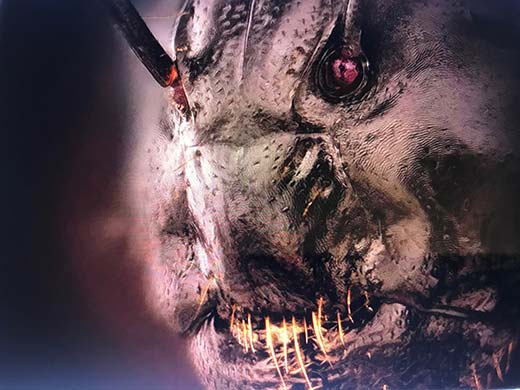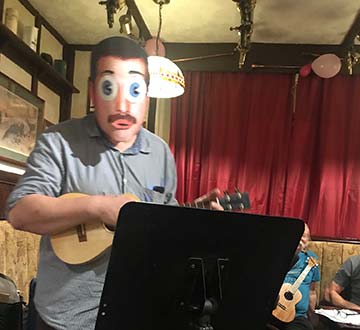
Third series, episode 18
All 110 episodes are available here on the HebWeb.
In the latest episode there's the fires and thrills of yesteryear, versions of Emily true and false, a face to face with an ant, misadventures on one leg and in the bath, a diagnosis by a TV doc, the lost art of bubble popping - and a cheery man in a mask.

Hebden Bridge Bonfire, 2013. Photo: HebWeb
Lost Lore
This time of year, I miss Hebden Bridge's colossal bonfire and spectacular firework display and the kind of raw and raucus celebrations I experienced in my youth.
Sure enough, the Hebden event became too big, too popular and, apparently, too violent. What we are left with are unsociable bangs and booms from surrounding hills, which lasted after midnight this year.
There's been other changes of course. We have pumpkin heads in place of the turnip lanterns and a commercialised, Americanised, version of Hallowe'en. Our Autumn festivities once cheered and sustained us into winter. These days we stock up on bags of cheap sweets for visiting kids clad in shop bought disguises. Next year, I fancy going to a Samhain party.
For those not in the know, An Samhain (pronounced 'sow-wen') is an ancient Celtic festival to celebrate the end of harvest and to bolster us for the cold, dark months ahead. The word derives from roots meaning the 'feast of the dead'. Celebrations include bonfires, guising (disguising) and feasting. Sounds familiar? In other words, it inspired the traditions followed by many of us till not so long ago. In the North, we also had Mischief Night on November 4th, which used to be harmless fun, unless bigger kids took over and pushed bangers through letter boxes.
Health and Safety hasn't gone crazy, it's been very sensible. But it still feels like we've lost something important.
Emily
At The Picture House, Malbecs in hand, we watched Frances O'Connor's interesting take on the brilliant, singular woman Ted Hughes called 'the weirdest of three weird sisters.' O'Connor's Emily is a free thinker, challenging Anglican morality in her personal life as well as on the page. But the film is weakened by distorting what we know of her life.
Take the chronology of the novels. Charlotte's Jane Eyre (1846) was the first into print, and in terms of initial impact was the big hitter. So the film's deathbed - or rather, chaise longue - finale, showing trailblazing young Emily passing on the baton to her hesitant older sister is incorrect. This disregard for facts, this lying about her dying, meant there wasn't a wet eye in the House, when there should have been many.
Cinematographer Nanu Segal does give us spectacular drone's eye panoramas of the moors, Emily's truest love, and reminds us of human fragility set against its enduring vastness. And the narrative wires into what Hughes and others have celebrated, that abandonment of self to the muse, as Hughes (and Plath) saw it, and rightly heeds the raw and powerful impact of Emily's poetry on others. That recognition of poetic genius was true from the start, whereas, her novel was a slow but lingering infection.
What has caused most controversy, is the notion that Wuthering Heights (1847) drew from a supposed sexual relationship between the eponymous writer and the young curate William Weightman, who is first turned on by her poems and then by Emily. He overcomes his religious qualms as he releases her from both her corset and petty convention. But my best guess is that the real Emily stayed buttoned up.
Preceding the film, there was a discussion between writer and Brontephile Michael Stewart and Bronte academic Claire O'Callaghan. In her talk, Claire revealed she helps students to develop a more rounded view of Emily and her world, directing them to look more attentively at her juvenilia and her poems. As for Wuthering Heights, and despite Michael and Claire's doubts, I still think that at the fast beating heart of the novel is a love story.
Afterwords
Despite being in a cinema that has frequently been under water in recent years, my Cathy (with a K), thought the film was a tad too saturated with inundations. As Mark Twain once said, "If you don't like the weather in England, wait ten minutes." Which comments I mentioned when the Mundays of Blackshaw Head asked my opinion of Emily. Roger M responded with a saying from up on t' tops:
"If you can see Stoodley Pike, it's going to rain. If you can't see it, it's raining."
Emily plays around with the chronology of events and the real Emily wouldn't have approved. Juliet Barker has bemoaned what John Sutherland calls 'the madness' of the Wuthering Heights plot, but he also points to some strange symmetries, which Halifax author Phyllis Bentley documented back in the 1920s, perhaps following the lead of one C.P. Sanger who noted that the novel includes precise birth, deaths and marriages of the leading characters, right up to Lockwood's last visit in September 1802 and Cathy's marriage in January 1803. All this despite any reference to contemporaneous historical events outside the micro world of the Heights, which Sutherland finds disturbing. "There is something of the neurotic about it." Or is it just the result of Emily having access from childhood to her father's church register of such events and then using such records as a way of structuring her narrative?
As for my own expertise on the Brontes, I once took a Belgian visitor round the parsonage, and pointing to an illustration, said confidently, "That's Patrick Bronte, he's quite unmistakable because he always wore that high collar."
Unfortunately, my visitor inspected the picture more closely, and announced, "It says here, 'The Duke of Wellington'."
Ant news

"Terrifying is the attent sleek thrush on the lawn," as Ted Hughes once attested. But what would he have made of this fierce beastie?* For the first time, 'the clear portrait of an ant has been captured.'
*Eugenijus Kavaliauskus won a prize for this capture in the Nikon small world and Microscope Competition.
Two go to the Crags
My passenger had been asking me to take him to Hardcastle Crags. We lived in Midgehole throughout his teenage years, and most years since then he's made the same request, not least because we spread his Nanna's ashes there.
Armed with his newly acquired parking permit, on a dark Tuesday morning, I drove past the Midgehole car park, meaning to park up in a Disabled Parking space close to Gibson Mill, but I hadn't explained this to him, and was surprised when, nearing a steep drop to the left of us, he unclasped his seat belt, then stepped out of the car when I braked.
I said I'd see him in an hour.
Parking near the mill pond, I did a five minute stroll, just long enough to realise that the giant wood ants had gone into hibernation. When I trudged inside I discovered that the electricity was down in the mill, and so I couldn't get my usual caffeine fix.
"Oh no!" I exclaimed in mock horror to the young lass on the till.
She replied, "There's notices on the door where you came in. Anyway, you should have checked on the website before setting out."
At which point an older assistant smiled and took over.
Outside again, I met storyteller Paul Degnan and pals, who were about to tootle back to Hebden along the river path. I said I'd better count them, in case one didn't make it. The sky had become a single grey cloud as they made off and it was spitting on to rain.
My mind took a slightly morbid turn. Just before the millenium, a guy was returning from a night at The Blue Pig and turning in the darkness to wee into the roaring waters, he slipped into the river and drowned. That same evening we went to a small dinner party in Wadsworth where the hostess choked to death. I'd be lying if I claimed that I gave full weight to these double horrors on this occasion, for I've done that many times before.
Driving back under dour skies, I noticed that the beeches weren't golden yet. But near the lodge, when I collected my passenger again, nature seemed to have done its part and he seemed contented.
Man in a mask

A heartwarmingly convivial time at a packed ukulele jam was enlivened even more when host Rob Collins donned a mask and sang a short medley of Amy Winehouse hits with the lyrics mashed up in a Frank Sidebottom style. And to round off the evening, Liz the landlady wouldn't let us leave until we all performed a mockney version of My old man said follow the band.
Mollycoddled
Recent research suggests that married men live longer, and some feminist wags have scoffed it's because our wives mollycoddle us. Allow me to retort:
One morning, after luxuriating in a hot bath, I languished contentedly for a while as the water gurgled out, but when I tried to emerge, slipped down again, tobogganing noisily along the tub.
I tried once more, but hauling myself up and reaching behind for support, my hand landed on a large bubble bath spill from the bottle I knocked over on my first attempt. Down I slid once more, zooming along like rolling thunder.
A voice shouted from below.
"Are you ok?"
"NO!" I retorted.
"… I can't hear you," came the dismissive response, despite my shout.
Left to my own devices, I clambered out of the bath, and realised that I was shaken but disappointingly uninjured, which limited the self pity I could dispense to myself. Mind, wrapping myself in a towel, I knew at that moment that I wasn't in want of a wife. What I really needed was me mom.
What's up, doc?
Apart from brief meetings at the pointy end of Covid jab queues, I haven't seen a GP for years, but I finally gained a diagnosis for my painful toes by watching the penultimate episode of Doc Martin.
The implausible plot involved a plumber with a painful toe having his foot stamped on by a rival plumber. Thus disabled, he stumbled into the village surgery to see Martin Clunes. GP Clunes rapidly diagnosed that the plumber's hypothyroid had caused a condition called 'Pseudo Gout'.
Pseudo Gout hurts as much as gout gout, but definitely fails to have the same street cred.
Proper Mollycoddled
The nagging ache in my right knee these past few weeks had eased. So, after doing my regular standing on leg for twenty seconds, to extend my longevity, I decided to try out my weaker limb.
Big mistake!
My dependable left leg was only given a five second break before it came to the rescue of its weaker neighbour, but that night my right knee gave me more grief than ever, causing me to wake up every half hour or so.
Next morning when I related my suffering to PW, she took over all my usual duties and even gave me her mum's old walking stick to help me totter about. To tell the truth, I allowed myself to wallow in being mollycoddled for a while, luxuriating for most of the day on our new sofa, and when I thought PW was losing sympathy, I showed her the blossoming bruises along my right arm and flank, to remind her of my recent tumble in the bath.
One day, I noticed a newspaper feature on my favourite life lengthening one legged exercise. But it turned out I'd been doing it all wrong! I should have been standing on one leg for a mere 10 seconds, not twenty. And the article made no mention of trying to repeat the trick on a different leg.
I thought it best not to mention this gaffe to my nearest and dearest. Instead, I asked. "Any chance of another cuppa - but could you make it slightly stronger this time."
Bubble popping
We're famous up north for cheerily talking to strangers and passing the time of day, (although not so much in Yorkshire, truth be told). But, being from Irish and Merseyside stock, I've been a hopeless case. Till now.
Post lockdown, I'm more cautious of popping other people's bubbles, and in pubs and cafes people realise I'm off limits when I spread my newspapers out and go into my own bubble. Meanwhile, others open their laptops.
Writers, some of whom might once have befriended me, put a force field up, even in noisy, music filled cafes, furrowing their brow inside their transparent sphere. These days, seeing them solo in town, or with a new girlfriend or writing course student at their side, I've curtailed my waves, although sometimes I venture a nod. I even stop myself from saying, "I'm reading your latest," which perhaps they might actually like to hear.
One pub lunchtime, at a nearby table, an extended family multi generational reunion bubble took place and stories were exchanged with leaky abandon. A woman had blacked out whilst she was driving and her car careered down an embankment and onto a railway track, where her life, and those of a hundred others, were saved by railway workers who downed tools and gave an emergency call to … well, who knows? I couldn't ask. But she did explain to the rest of her bubble that her plight was caused by undiagnosed diabetes.
Later, I thought of another incident of a driver blacking out and veering off road, but not onto a railway lines. It happened on that fast stretch of road above Baitings reservoir. That driver once beat me in an interview for a deputy headship. The interview must have been half my lifetime ago, but three quarters of his. Then there was that inebriated couple who, in a passion filled bubble, drove into The Triangle pub one night in the nineties. They were found bloodied and half naked but completely dead, only to live on for a while in a coroner's report, some news reports and local gossip.
Haworth story circle
During a break when we were all having a natter, a woman shyly said that she couldn't tell stories. I wanted to say, "You're doing it now. Eighty percent of our speech is made up of narratives."
Adam, who was MC and also does ghost walks round the village, said his customers had been angry about the warped narrative in Emily.
Murphy's Lore, the book is available to order here
If you would like to send a message about this piece or suggest ideas, email George Murphy
More Murphy's Lore
See the Murphy's Lore home page for all 110 episodes.


